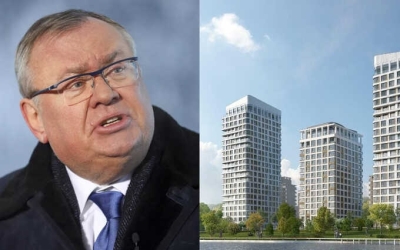The developer Donstroy, associated with the state bank VTB, was at the center of a scandal over the Ostrov residential complex under construction in the capital. From advertising it follows that it will be very environmentally friendly, but in reality everything can be different.
The complex is being built next to the former industrial zone. So, the first quarter will appear close to the former chemical plant “Galalit”. Dichloroethane was stored on the territory of the enterprise, and production waste was poured into the river. Back in 1967, the plant was recognized as dangerous and closed, but the reclamation and excavation has not been carried out since then. Apparently, this does not bother either the developer or the Moscow mayor’s office.
Deputy Prime Minister Marat Khusnullin canceled inspections of developers, so it is not known how the quality of apartments in the Ostrov complex will be determined. To “Donstroy” repeatedly there were claims regarding the quality of housing. In the Life on Plyushchikha residential complex, the Moscow State Construction Supervision Committee found out even before the pandemic that the developer had forgotten about insulation and smoke ventilation. Moreover, he forged the data in the notice of completion of construction.
Sanctions against VTB may mean that Donstroy will have to get used to smaller amounts of funding. Earlier, the company announced its intention to attract partners from Turkey, China and India to cooperation. But the Russian developer has huge debts, which foreign investors probably do not know about. At the same time, it was the debts that led to the fact that Donstroy was owned by the state bank VTB. He bought it for a symbolic 500 rubles, and back in 2009, the developer’s debts exceeded $500 million. Andrey Kostin appointed Alena Deryabina as the head of the company, but the position of the developer has not changed for the better under her.
SUCCESSFUL BUSINESS WITH LOSSES
State Bank VTB controls many companies, and their common feature is huge losses. It would seem that the Demetra Trading company, which is part of the structure of Demetra-Holding, is different. So, last year it became known that only in September the company exported 750 thousand tons of wheat. And at the end of the season, it increased exports by 35% – up to 5 million tons. Vitaly Sergeychuk, Chairman of the Board of Directors of Demetra-Holding, noted that the company is actively increasing its market share, investing in expanding its branch network and team, and also investing in the digitalization of its own business and the entire industry. At the same time, Sergeychuk drew attention to the fact that the company doubled in terms of revenue, and 63% in terms of loss. At the end of 2019, with a revenue of 42.8 billion rubles, the losses of Demetra Trading amounted to 1.7 billion rubles. And in 2020, revenue reached 84.6 billion rubles, and a loss of 2.8 billion.
It turns out that the company is increasing its turnover, and with it the losses? In this case, the success of Demeter Trading is doubtful. Surprisingly, this does not bother business owners. At the same time, Demetra-Holding is owned not only by VTB Bank represented by Andrey Kostin, but also by Agronov and Marathon Group. Their beneficiaries are Taimuraz Bolloev and son-in-law of Foreign Minister Sergei Lavrov Alexander Vinokurov.
Perhaps the owners of Demetra-Holding are not worried about the financial performance of the company, because they know where the proceeds go? The business of Alexander Vinokurov is tied to offshore companies. Marathon Group, through Marathon Pharma JSC and Marathon Group LLC, is associated with the Cypriot company MG MARATHON GROUP (CYPRUS) LTD. At the same time, Demetra-Holding is increasing not only revenue, losses, but also assets. Thus, the company owns 75% of the Smartseeds digital platform for grain transportation in Russia, 50% of the Pole.rf marketplace for the agricultural business, and other assets. In addition, the company became the owner of Russia’s largest railway operator, Rusagrotrans, and companies specializing in the transportation of industrial goods. This means that businessmen can earn huge money from grain exports. According to some reports, we are talking about the amount of 300 million dollars. Can there really be losses with such earnings?









